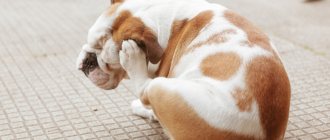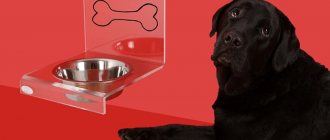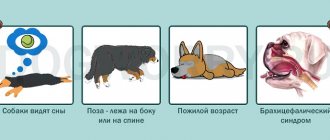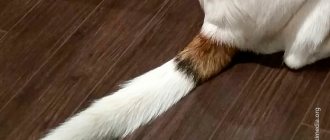Pollakiuria is the term for frequent urination in dogs. This phenomenon may be a harbinger of a developing disease, may signal that the pet is experiencing stress, and sometimes this is the norm. When you should worry and contact a veterinarian, and when you can help your pet at home, this article will help you figure it out.
The frequency of urination depends on the health of the genitourinary organs. The condition of the lower urinary tract affects the storage capacity of the bladder and the nerve pathways that stimulate the act of urination itself.
Thus, frequent urination may indicate a disease of the lower urinary canal, damage to the bladder or urethra.
How often should a dog urinate?
Each dog has its own normal frequency of urination. This largely depends on the regime in which you and your pet live.
If you walk your pet two to three times a day, and he does not have free access to the street, then he will only urinate during these walks (with proper upbringing).
It is worth considering that all dogs behave differently during walks. Some perform their need at one time, while others urinate a little several times during a walk, thus marking their territory.
Here it is important to distinguish the natural process of “marking” from painful frequent urination (a responsible owner will be able to see this from the behavior of the pet).
If your dog has free access to the street (it’s good if it’s a private yard, because self-walking on the street is deadly) or at home there is an adapted toilet (tray or diaper), then the frequency of urination can be about 7-8 times a day. It depends on the size of the dog, the amount of water consumed and some other factors.
It's different for puppies. Up to three months they urinate approximately 12 times a day and during this time they do not control this process.
Diseases associated with frequent urination
Due to various diseases, your pet also has problems with urination. These can be all kinds of inflammations, which are difficult to identify even with a complete examination of the body. But still, something needs to be done. And what?
To begin with, we recommend recording the unusual diet and regime, walking your pet and what he encounters, how much liquid he drinks. This is very important information that will help the veterinarian quickly deal with this problem. At the same time, there are diseases such as: cystitis, polydipsia, spinal injuries, childbirth, ecotopia, and we will briefly talk about them now.
What to do if your pet has cystitis? To provide accurate assistance, you should first take a urine test; this is one of the important laboratory tests. Incontinence and frequent urination, even if your pet is sleeping, indicates cystitis. What causes this disease? In normal cases, hypothermia contributes to this. Antibiotics are used to treat dogs; improvement is noticed after a few days from the start of use. But if the owner treats this negligently and does not treat his pet, then the problem will worsen. The animal will begin to pee in blood, and then will be completely unable to relieve itself, and a long and thorough course of treatment will be required.
With polydipsia, your pet drinks two to three times the daily amount of water, and frequent peeing should not be surprising. In bitches, this phenomenon is observed in the presence of pyometra. In these cases, it is recommended to do an ultrasound and not self-medicate. The main root cause of this disease is diabetes mellitus, kidney failure, infections in the genitourinary system, etc. And this cannot be done without the intervention of a veterinarian.
With various injuries to the vertebra, the nerve endings and spinal canals may not function, and it is not possible to get rid of this problem. During childbirth, in some cases, nerves are pinched and limbs weaken, your pet looks sick and may abandon her baby. This will require a full comprehensive examination by a veterinarian to choose a treatment method. You may be offered to operate on your dog, but it is still better when tests are done first and treatment is carried out.
There is also a disease called ecotopia, which is congenital in nature and most often occurs in female dogs. It is diagnosed using anamnesis for puppies at a young age. Corrected - with the help of surgery or urography.
And in conclusion, we can say that in order to save your pet from the above problems, you need to accurately determine the cause of their occurrence, and only then engage in treatment. In any case, every problem can be solved. You just have to want it!
Frequent urination in dogs may indicate problems with the urinary tract. Often this is inflammation, which can occur in combination with severe pain. Constant urge in females
and males may have different natures, so the consequences of this symptom are also different.
Inflammation of the urinary tract does not threaten the dog’s life, but it can cause a lot of trouble. If treatment is not started in time, the disease can affect the kidneys. Problems with the urinary tract in females are often fraught with the development of neoplasms. Therefore, if you notice such a deviation in your pet, immediately show it to the veterinarian.
Causes and symptoms
The causes of frequent urination can be divided into natural and pathological.
Natural causes
High water consumption
This occurs during the summer months when it is hot. Or if the dog was active a lot during the day. The more water you consume, the more often you urinate, this is natural. However, if water consumption is many times higher than normal, then this is an alarming symptom called polydipsia.
Overexcitation of the nervous system
Typically, small breed dogs can pee from emotional overstimulation. The individual characteristics of the pet or gaps in upbringing may play a role here. It happens when you don’t spend enough time with your dog. In those rare moments when you pay attention to your pet, she can forget herself in joy.
Stress
If the dog is under stress. Pollakiuria is a common symptom, even if everything is fine with your health. Stress can be provoked by a change of place of residence, the appearance of new pets, punishment, even quarrels between family members, affecting the pet.
Sexual characteristics
It has already been said above that cables can urinate frequently and little by little during a walk. This is how they mark their territory. Neutered females usually do not do this. Bitches usually cope in one or two times during a walk. But when a dog is in heat, frequent urination accompanies this entire period.
If the causes of frequent urination are natural, then usually there are no other symptoms other than pollakiuria and the urine is normal: without impurities, transparent, light yellow. The exception is during estrus. Also, stress can manifest itself as several symptoms, or just one.
Pathological causes and their symptoms
Nephritis, glomerulonephritis and some other kidney damage
Nephritis is an inflammation of the kidneys caused by an infectious agent. A dangerous disease in which all tissues of the kidney are affected, and subsequently the inflammation spreads to the tissues of other organs. If no measures are taken, death is possible. Symptoms:
- frequent urination in small volumes;
- Blood is found in the urine. In some cases, this can only be done by conducting laboratory tests, and in advanced cases, the color of urine even changes due to blood;
- proteinuria (increased protein in the urine, detected during laboratory testing);
- pain when urinating. The dog arches unnaturally and may whine;
- difficulty urinating;
- elevated temperature;
- violent, profuse vomiting;
- the hind legs may be weaned for a short period of time.
Various forms of cystitis
Cystitis is an inflammation of the mucous membrane of the bladder. Often, together with cystitis, there is inflammation of the urethra - urethritis. Symptoms:
- urination is frequent and painful;
- increased body temperature;
- appetite decreases;
- the dog is losing weight;
- vomiting is possible.
Sand in the bladder, kidneys or urethra
If such a pathology is detected, then it is necessary to take therapeutic measures as soon as possible, since stones can form over time. In some cases, this sand can be sharp, which causes extreme pain to the pet. Symptoms:
- urination is frequent, but in very small volumes, sometimes just a few drops come out;
- blood is often found in the urine;
- the main symptom is difficulty urinating due to pain. The dog sits in one place for a long time, strains, and sometimes whines in the process.
Detrusor hyperspasticity (overactive bladder)
The detrusor is a muscle that contracts the bladder when it is full. When this muscle is overactive, the bladder empties even when it is not even half full.
This phenomenon may be associated with the individual characteristics of the dog’s body, but more often this occurs after an injury, when there are disorders of the spinal column, as there is a disruption in the innervation of the bladder. Another name for this pathology is neurogenic bladder.
Symptoms:
- sometimes, such a deviation does not bother the dog in any way, except for frequent urges to go to the toilet;
- in other cases (after injuries), the dog experiences involuntary urination, leakage, etc.
This pathology has different ways of development and manifestations. Many complications are possible, most often urinary tract infections.
If a dog drinks a lot (polydipsia) and urinates frequently (pollakiuria), then the combination of these two symptoms may indicate a number of diseases:
Diabetes
It is an endocrine disease caused by a variety of causes that interfere with insulin production.
Pyometra
This is purulent inflammation of the uterus. Occurs only in unspayed female dogs, usually over five years of age.
The general conclusion regarding the pathological causes of frequent urination (we have listed the main ones) is that in pathologies of the genitourinary organs, pollakiuria is not the only symptom of the disease. Based on the general condition of the pet and accompanying signs, it is easy to suspect a particular disease.
Causes
If your dog begins to pee a lot not only as an adult, this indicates some kind of problem in its body. You need to realize that your pupil lives according to his instincts and physiological laws, since he is very emotional.
So, it has been noticed that a very frequent desire in dogs to mark territory appears in the following cases:
- sexual desire. During this period, the four-legged animal imagines that it is ready for copulation (this happens not only in boy dogs, but also in girls during the period of heat, when they often pee in small portions). It has also been proven that by the smell of urine, which contains a significant amount of information, for example, it can be used to determine the individual, gender, physiology and much more;
- innovations in the house. For example, buying new furniture, the appearance of a baby, or another pet - all this brings unknown smells to your dog, and they make them familiar, i.e. theirs;
- social status in the family. Since dogs are pack animals, therefore, when their importance in the family decreases, this serves as an excuse to leave feces in the bed or urinate on the furniture. This often happens when you get a new pet, or when your grown child begins to raise an adult dog.
Many pets urinate frequently due to an incorrect daily routine. For example, consider this situation: the owner is in a hurry to go to work, naturally, there is not enough time to walk his pet, and as soon as his four-legged friend relieves himself, he immediately takes him home. In this case, if your dog likes long walks, in order to take a longer walk he will relieve his needs at home. Due to unfair punishment and poking his nose into the puddles he made, the pet develops fear and in your presence will be afraid to do his need. But after you leave, he is free to do whatever he wants.
And your pet’s frequent urination may also depend on behavior, and kicking, screaming and poking the nose will not help correct the situation, but will only worsen it. Also, using a variety of treatments will be a waste of your time and money spent on purchasing various drugs. In this case, you need to thoughtfully raise your four-legged friend, show patience, but confidently and calmly insist on your own.
And male dogs have a natural intuition to mark their territory; they often pee in the corners. Sterilization, after which the animal’s sexual instincts decrease, will help in such a situation.
Of course, even in the presence of various abnormalities, dogs often experience urinary incontinence; it can be congenital or acquired; this is associated with weak contraction of the urethral muscles. In this case, even the use of various medications or other additional means of urine will flow out.
All owners are interested in the question, what to do about this problem? First of all, we advise you to contact a veterinarian. If this disease is detected at an early stage, it is still treatable. However, the disease may be incurable, but not uncontrollable.
Another answer to the question “Why did the dog start peeing often?” is her age, this is due to the fact that smooth muscles soften in old age and in this case it is necessary to support the pet with the help of medications.
In young bitches, this problem occurs during the period of estrus, and they experience nagging painful sensations, which lead to urination to ease their well-being and reduce excess pressure. The main thing is not to scold your dog, because he understands why this is happening, but is not able to cope with it. It is recommended to walk her more often.
Another factor of frequent peeing is that your pet consumes a large amount of water, because of this it cannot wait until a walk. In this case, anxiety is considered to be enormous thirst, which may indicate various health difficulties. Now let's look at the causes of diseases in dogs.
First aid
The first thing you should do is contact a veterinary clinic for a full diagnosis of your pet.
Attention! You should not give any medications from your home medicine cabinet to your pet. Even if it helped the neighbor's dog. You can only do harm.
All you need to do is provide your pet with enough water (especially if urination is frequent and little by little) and walk it more often.
If there is bad weather outside, if possible, provide the dog with a toilet in the house - lay out a diaper or show a tray (if the dog’s size allows it). The dog's place should be warm so that a draft does not blow in.
If urination is frequent, but without difficulty, in moderate quantities and the urine is normal (light yellow, transparent and without impurities), then it is worth considering that the dog may be under stress.
But even if nothing else bothers your pet, it’s better to play it safe and have his urine tested in a laboratory; perhaps they will find impurities that are invisible to the eye.
Diagnostics
A complete diagnosis is only possible in a clinical setting. First of all, it is important for the veterinarian to know what the pet is fed, whether it is vaccinated, what has bothered it recently, and in general what diseases/surgical interventions the animal has suffered during its life. These questions must be answered by you, the owners.
Then the veterinarian examines the dog and prescribes the necessary laboratory tests, standardly these are blood and urine tests.
If necessary, additional research methods will be prescribed, for example, ultrasound or x-rays.
Preventing urinary incontinence in dogs
Prevention is as follows:
- Make sure that your pet does not catch a cold or become hypothermic. Do not allow your dog to swim in cold water during the spring and fall months. Provide the animal with warm and soft bedding to rest.
- Monitor your dog's diet. An incorrectly designed menu can provoke the development of urolithiasis, which causes frequent urination.
- Walk your pet more often. This is especially true for older animals and small puppies.
- Educate the animal and explain to it that it is only possible to empty its bladder outside.
Urinary incontinence and frequent urination are serious symptoms.
If your dog's urinary incontinence is caused by injury, do not try to treat it yourself.
Symptoms that indicate the development of a disease or pathology of internal organs. If you notice that your pet has begun to urinate on itself or frequently sits down on the toilet, contact your veterinarian and have your dog examined.
For dog breeders, a situation where the pet cannot tolerate walking and the dog often urinates
in an apartment - this is unpleasant nonsense. Everyone knows that a puppy can do this until the age of one year, and then the dog fulfills all its needs on the street. But there are situations when, moreover, in an apartment. Why does this happen? Should you punish your pet for such pranks or is it better to take him to the veterinarian? We suggest we look into this issue together.
To avoid problems with your pet’s health, we advise you to contact the Animal Veterinary Care Center “YA-VET”, where highly qualified veterinarians will advise you on how to properly feed, how to treat and how to prevent your dog from getting sick.
Treatment
Treatment is prescribed exclusively by a veterinarian after a full diagnosis and diagnosis has been made.
Also, the pet is prescribed a special diet, in which it is very important to maintain the required level of protein and closely monitor water consumption.
Of the ready-made feeds for urinary tract diseases, Royal Canin urinary is usually prescribed.
It is very important to follow all the veterinarian’s recommendations in order to stabilize your pet’s condition and prevent relapses.
Popular questions
Why does a dog urinate frequently after mating?
There may be several reasons for this phenomenon. The most dangerous of them is infection during mating. You can’t do this without the help of a veterinarian. Also, a consequence of mating may be non-infectious inflammation, which provokes frequent urination. This can also be caused by simple hypothermia, so it’s not always the male’s fault.
Also, this may have a natural cause - hormonal fluctuations as a result of estrus and subsequent mating.
Why does a dog urinate frequently during heat?
During estrus, pollakiuria is considered normal; it is associated with a hormonal surge. The dog urinates frequently and in small portions. In the urine you can find viscous mucus with a small admixture of blood. Owners of bitches usually know what is normal for their pet during heat.
Why does my puppy pee often?
Until approximately three months, puppies do not control the process of urination and, normally, pee up to 12-13 times a day. Requiring patience from them to go to the toilet three times is almost impossible.
If you notice that your puppy has difficulty urinating and sits down several times in an hour, then you should contact a specialist.
Diseases
If a dog often goes to the toilet “smallly”, this may indicate the presence of serious diseases. Monitor your pet before visiting the veterinarian
, since information about the frequency of urges, the quality of walks, the amount of water and food that the dog consumes will help the doctor make a diagnosis.
Cystitis
Frequent urge to defecate may indicate the presence of cystitis. In order to make an accurate diagnosis, you will need to do a urine test. Cystitis is indicated not only by incontinence, but also by the presence of an extensive inflammatory process. Sick puppies and adult dogs may urinate even in their sleep.
The cause of the development of cystitis
is severe hypothermia. For treatment, your veterinarian may prescribe a course of antibiotics. Within a few days after the start of therapy, the pet will feel better, but this is not a reason to interrupt treatment. A completed therapeutic course will help protect the animal from relapses.
Polydipsia
With this disease, the animal drinks a lot of water, so it is not surprising that the urge to urinate also occurs frequently. This disease predominantly develops in females
. For diagnosis, your veterinarian may order an ultrasound. Treatment at home can be dangerous, so you should immediately contact a specialist.
A constant desire to drink is not the main problem a dog may face. Polydipsia is just a symptom of developing diabetes or kidney failure.
This is a congenital disease that can cause frequent urination. The disease is diagnosed at an early age and affects females more often than males. The diagnosis is made on the basis of anamnesis. If the information received is not enough, the doctor may prescribe an additional examination. Upon confirmation of the diagnosis, the veterinarian
may perform surgery, sometimes urography is used.
Urination in a dream
A dog pees at night for the following reasons:
- disease;
- severe fear;
- young age - puppies cannot hold urine for a long time;
- elderly age.
Briefly about the main thing
- Frequent urination is called pollakiuria.
- The causes of pollakiuria can be natural or pathological.
- Natural ones include: high water consumption in the hot season, emotional overexcitability, stress, estrus in females, marking territory in males during a walk.
- Pathological include: various diseases of the urinary tract (nephritis, cystitis, urolith, sand in the bladder or kidneys, etc.). And also, disruption of neurogenic conduction as a result of injuries to the spinal canal.
- Diagnosis is carried out in a veterinary clinic, since, at a minimum, it is necessary to conduct laboratory tests of blood and urine.
- Treatment is prescribed by a practicing veterinarian; you should not resort to traditional methods, much less use drugs from a human first aid kit without prescription.
Treatment of pathology
If you notice frequent urination in your dog, you can give the animal a drug that relieves the spasm. This medicine can only relieve symptoms, but not solve the problem. If your pet is in severe pain, contact your veterinarian immediately.
It is prohibited to independently provoke urination by massaging the bladder. Doctors do not recommend giving diuretics to animals.
If the frequency of the urge to urinate is not critical
, then the doctor can prescribe treatment at home. In this case, the animal owner must fully follow the doctor’s instructions, since self-medication can lead to complications.
The dog should be taken to the doctor immediately if there is a blockage in the urethra. First of all, the doctor must restore normal urine flow. During catheterization, sedatives and painkillers are used. If it is impossible to insert a catheter, then the doctor performs an operation, but such situations arise extremely rarely.
Frequent urination may be a symptom of a serious illness. If your beloved Yorkie or dog of another breed frequently urinates, you should immediately contact a veterinarian, who will determine the cause of this phenomenon and, if necessary, select treatment.
Attention, TODAY only!
In this article I will talk about urinary incontinence in dogs and frequent urination. I will give the reasons for such a long pathology. I’ll tell you why your dog often empties its bladder and what to do. I will give methods of treatment, what medications and prevention of urinary incontinence.
Urinary incontinence most often affects older animals, but this disease can also occur in young animals. The pet is not able to control the process of urine excretion, which is why a puddle can appear in any place where the dog was.
There are several types of disease:
- True incontinence. As a result of injury or pathology in the structure of the urinary organs. The disease also develops in sterilized animals due to a decrease in the muscle tone of the urethra.
- False. Develops against the background of other diseases (diabetes mellitus, kidney disease, urethritis, etc.). May write frequently. The same goes for the joy of being at home that I met the owner. Also, the reasons include the appearance of neoplasms or cysts in the cavity of the ureters and bladder.
- Stressful. A pet may pee a lot from severe stress or from a violent manifestation of emotions (for example, a meeting with the owner).
- Senile. Characteristic of an old individual whose reflex activity is weakened.
A dog suffering from incontinence is unable to control the process of urination, so it may wet itself in its sleep or simply while resting.
Older animals need more frequent walking.
Sometimes involuntary urine leakage is caused by obesity in a dog











